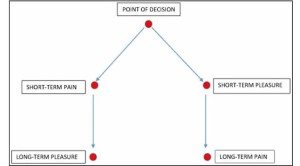What is the biblical perspective on how to handle overwhelming feelings?
There are healthy and unhealthy ways to do that.
The healthy way to deal with strong feelings starts with thinking wisely about feelings in general. Our pastor often says that feelings are real (we do feel them, often intensely), but they’re not reliable (they make terrible indicators of what is true). So we should acknowledge them, but not be led by them.
Especially powerful, overwhelming feelings.
Allowing yourself to be controlled by your feelings is unwise and immature. The flip side of that is our example of Jesus in the Garden of Gethsemane. No one ever experienced the strength of horrific feelings like He did, to the point of sweating blood. He allowed Himself to feel His feelings, but then He turned in trust to His Father, submitting to His will. He set the bar for how to handle overwhelming feelings: feel the feelings, and trust the Lord.
Often, though, especially in the young, people deal with their strong feelings in unhealthy ways.
Stuff them. One of my friends refers to her “vault,” the supposedly safe, impenetrable locker where all the painful feelings of her horrific childhood were supposed to stay stashed. Out of sight, out of mind, out of touch. Until the vault developed cracks, and those strong feelings of pain and shame and horror and fear started slipping out sideways into her relationships and her dreams.
This is not God’s plan for emotional health. David wrote in Psalm 51:6, “You (God) desire truth in my innermost being.” In Romans 1, Paul referred to those who “suppress the truth in unrighteousness” (1:18). Stuffing and denying feelings is not truthful. And it doesn’t make them go away. Someone even wrote a book titled, “Feelings Buried Alive Never Die.”
Let them explode. Without self-control, the angry person can vent his or her anger with verbal shrapnel and even physical abuse. Road rage, anyone? (I blogged about this in The Problem with Heart Bombs.)
Self-injure. The “solution” of cutting, burning, skin-picking, hair-pulling, and other forms of self-injury has been growing in popularity over the past decade or so. These destructive behaviors can provide momentary relief by distracting attention to soul pain by causing body pain. When it becomes an addiction, the release of endorphins, feel-good brain chemicals, provides an additional reason to keep repeating it.
Those choosing to self-injure need an extra measure of grace and understanding, because their level of soul pain is especially high to go to that extreme. In addition to the emotional pain, I believe they are experiencing a nasty spiritual warfare attack. Jesus said that our enemy, Satan, “comes only to steal, kill and destroy” (John 10:10). The “slow suicide” of self-injury is a pernicious way to do that. I do think that cutting is a demonic suggestion, based on the story in 1 Kings 18 where the prophets of the false god Baal cut themselves trying to get the attention of their idol. Paul explains in 1 Corinthians 10 that sacrifices made to the false gods of idols are actually sacrifices to demons, so there is a biblical connection between cutting and demonic influence. (I’m not saying anything about demon possession, which is not even a good biblical interpretation of the New Testament word demonize; rather, I think those who cut hear the whisper from the enemy, whose native tongue is lying [John 8:44]: “Cutting will help. Cutting will make me feel better. Cutting is the answer.”)
God’s word offers us some healthy ways to express strong, overwhelming feelings.
Talk about them. The highly sensitive and emotional King David invited the Lord into his strong feelings, and he used words to express the agony of his heart. Many of the psalms are powerful expressions of the psalmists’ emotions. Consider Psalm 55:1-5 for example:
“Listen to my prayer, O God. Do not ignore my cry for help! Please listen and answer me, for I am overwhelmed by my troubles. My enemies shout at me, making loud and wicked threats. They bring trouble on me and angrily hunt me down. My heart pounds in my chest. The terror of death assaults me. Fear and trembling overwhelm me, and I can’t stop shaking.”
When overwhelmed by strong emotions, telling someone else who can be trusted to listen respectfully and with understanding is a healthy, constructive way to express feelings.
Writing one’s thoughts and feelings in a journal is a powerful process to move the feelings from the inside to the outside. (I recently wrote about that here: Pen > Puter)
Let yourself cry. Then there is God’s good gift of tears. God created us with tear ducts as a way for strong feelings to leave the body, moving from our hearts on the inside to our cheeks on the outside, and that is much better, much healthier, than cutting so that the “red tears” flow.
Psalm 56:8 shows us that David was not afraid to let his tears fall:
“You keep track of all my sorrows. You have collected all my tears in your bottle. You have recorded each one in your book.”
God considers our tears precious enough to collect!
Sometimes, though, people have trouble accessing their unshed tears. They are locked up inside. Often this is because of having made a self-protective inner vow, usually many years ago: “I will not cry.” It was considered unsafe because crying resulted in shaming or being punished. When children make a personal inner vow like that, it functions like the cruise control on a car, controlling the speed. The little person who made the vow many years before created a hard and fast life-rule, and until it is addressed and renounced, it stays in place. Paul wrote in 1 Corinthians 13:11, “When I was a child, I used to speak like a child, think like a child, reason like a child; when I became a man, I did away with childish things.” One of those childish things can be making an inner vow—which ends up, from the perspective of adulthood, being what the Bible calls a “foolish vow” (Lev. 5:4-6). And the wise thing to do with a foolish vow is break it, or renounce it or cast it off in Jesus’ name. Romans 13:12 instructs us to cast off deeds of darkness, which this kind of vow would be because it is the opposite of trusting in God.
What should we do with hard, overwhelming feelings?
• Don’t try to hide from them or stuff them.
• Acknowledge them and let yourself feel them. Invite Jesus into your feelings.
• Talk about how you feel, and what you’re thinking, with a safe person.
• Let yourself cry them out of your body one tear at a time.
And follow the example of the Lord Jesus Christ, fully God and fully man: Feel the feelings, and trust the Lord.
This blog post was originally published at blogs.bible.org/engage/sue_bohlin/how_should_we_handle_overwhelming_feelings on June 16, 2015.

 Oprah: When this is all said and done and we look back on this time of you, Rielle Hunter, the mistress and all of that, what is it you want people to really understand about what has happened here?
Oprah: When this is all said and done and we look back on this time of you, Rielle Hunter, the mistress and all of that, what is it you want people to really understand about what has happened here?